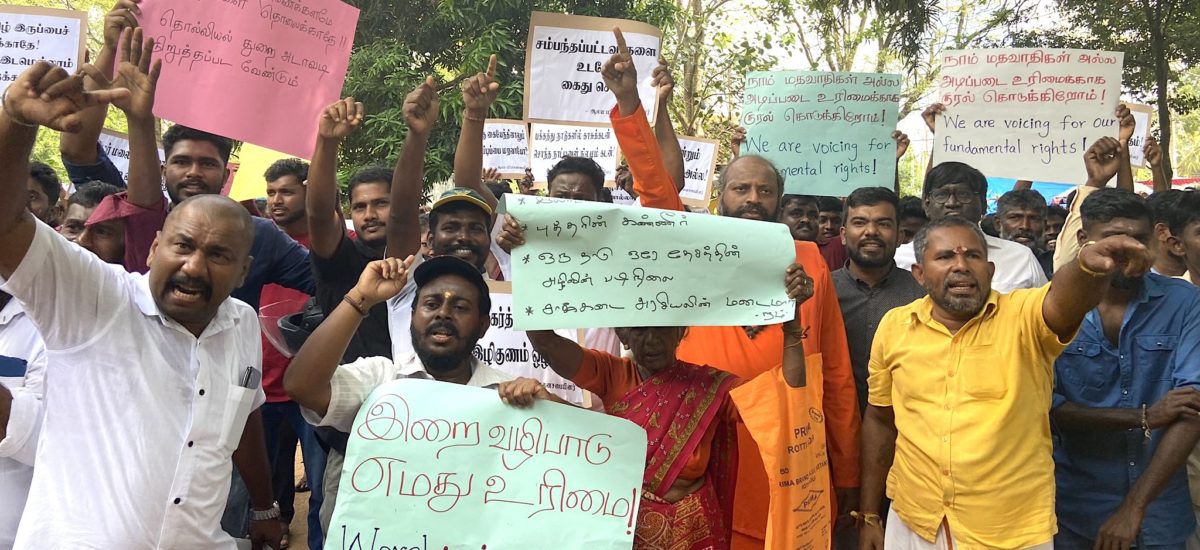Photo courtesy of Kumanan Kanapathippillai
Media personnel and activists are reporting several cases of Hindu religious sites being damaged, relics removed and Buddhist statues erected in their place with the collaboration of the Department of Archaeology. Hindu kovils are being re-named as Buddhist temples. There are reports of land grabs from Tamil villagers by the military and monks in the North and East in order to settle Sinhala villagers. Tamils and Muslims complain that they are not allowed to practice their religion freely in contravention of their fundamental rights guaranteed by Sri Lanka’s constitution and the international treaties it has ratified.
In a video interview with Maatram Mahendran Thiruvarangan, Senior Lecturer at the University of Jaffna, charged that the Department of Archaeology was promoting the Sinhala-Buddhist agenda of the government. The media and politicians of the South were spreading racism by claiming that Tamils were against Buddhism, he said.
Here are excerpts from the interview:
“This issue should be discussed in the South. Progressive movements, trade unions, student movements, educational institutions and civil society organisations must give prominence to the archaeological violence in the North, create awareness and protest.
“The Department of Archaeology claims that there were several places in the North which were of importance to Buddhism many centuries ago and that they had been destroyed over time. The department is now in the process of finding these places and rebuilding them. Archaeology is an important aspect scientifically but we should also look at how archaeological activities are carried out and how they are linked to the government.
“The Department of Archaeology views the country’s history as pertaining to Sinhala Buddhists and is an institution that gives importance to archaeological aspects pertaining to Sinhala Buddhism. Other institutions such as the Wildlife Department and the Mahaweli Authority are also being used by the government for this purpose.
“For example, there could have been Buddhist sites in some places 2,000 years ago but what is the need to look for them today? There are people who belong to other religions who now live in places which they claim to be Buddhist sites, and they are worshipping in these places. They have their own traditions, which also have a long history. When you are digging for information about a history which is over 2,000 years old, does it mean that another history that spans around 500 years is of less importance?
“The activities of the Department of Archaeology disregard the faith, religious rights and the bond between the community and the region. They come there out of the blue and claim that this site has some importance and therefore they are going to conduct research. They then declare it as a security zone, deprive people of their right to worship within the premises, bring in the military to start work, get military security and bring in monks and allow them to conduct religious activities.
“There have been instances where they take over land and prevent people from doing agriculture activities. One such incident was reported from Kurunthurmalai. This is not only a cultural issue also affects people economically. When we think of archaeology, we think of something that is ancient. The important question is what does it have to do with the people living now?
“Are the views of the people taken into consideration when decisions are made? Implementing this agenda through a centralised body based in Colombo, that too with the protection of the military, is an act of dominance. We do not know the level of importance the Archaeological Department gives to the historical narratives of minority communities and the extent of contribution by experts who work on histories pertaining to minorities.
“I would say that the Archaeology Department is indulging in cultural violence in the North and East. This issue should be discussed in the South. This is not a struggle that should be carried out by the people of the North alone.
“The response to these actions from the North is shallow. One response is to claim that the North and East is the homeland of the Tamils and that the region is being targeted with Sinhalisation and Buddhisisation to reduce Tamil influence. While this is true, it does not mean that the North belongs only to the Tamils. There are Muslims who live here too. They were evicted from this region so if our response to this is based on Tamil nationalism, we are also excluding people. The North is a pluralistic region so we have to adopt an approach that embraces that pluralistic nature.
“The other response is when Buddha statues are put up in the area to place Nataraja statues or Amman statues on the roadside. Hindutva need not be the response to Sinhala nationalism; instead the response should be to reiterate pluralism.
“We do not need to oppose Buddhist nationalism claiming the North and East as the homeland of the Tamils. There are people from various communities living here and they have a history that dates back a long time. There have also been changes in history. For example, there may have been some links to Buddhism, some may have followed Buddhism and there may have been Buddhist constructions in this region at some point of time. That may have changed and a different religion may have come into being. We should understand the natural cycle of history.
“Today, this land belongs to the people who are living here. They have a bond with the land. We do not have to focus on who lived there before and who they were. The protests and struggles for equality and rights should not be based on our identities of ancient times. Our demand is that we need equality today and we should live in harmony today.”
To view the full interview in Tamil please see https://maatram.org/?p=10845

